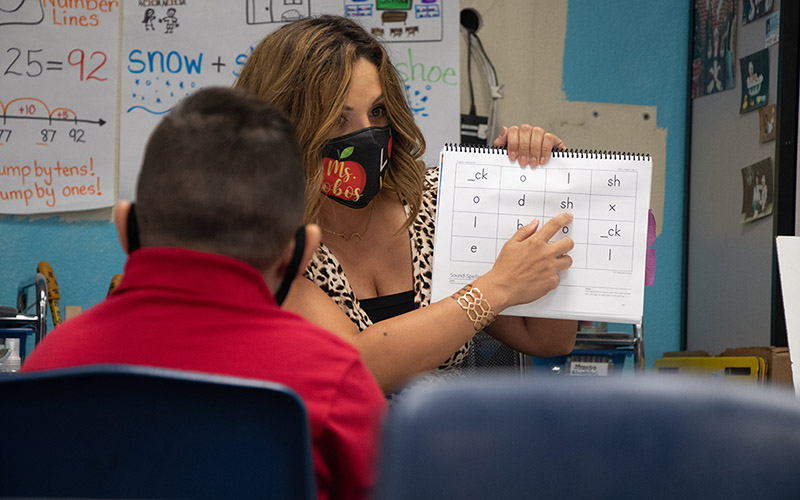PHOENIX – The clock is running out for state legislators to override a cap on spending that would prohibit Arizona public school districts from disbursing nearly $1.2 billion that’s already been approved by the Legislature and budgeted.
“This year, it seems it’s turned into a little bit of a political football field going back and forth,” said Marisol Garcia, vice president of Arizona Education Association. “This is something that shouldn’t be an issue, but, unfortunately, the majority in the Legislature has decided to make it an issue.”
During her State of Education address at the Capitol on Tuesday, State Superintendent of Public Instruction Kathy Hoffman said if the cap isn’t overridden by March 1, public school districts will have to cut 16% of their individual budgets before April 1.
“Schools will not be able to maintain their current day-to-day operations without action,” she said. “Let me be perfectly clear that inaction is not an option, and it’s appalling that this was not the first issue addressed when the (policy) session started a month ago.”
What is the aggregate expenditure limit?
The aggregate expenditure limit, passed by voters in 1980, is an amendment to the Arizona Constitution that sets a spending limit for school districts based on total spending of all districts. The cap only affects district public schools; charter schools did not exist in 1980. A two-thirds majority of the Legislature is needed to override the cap and allow the $1.2 billion to be spent.
State Rep. John Kavanagh, R-Fountain Hills, said the amendment was a way to placate Arizonans concerned about high taxes. The formula that calculates school district spending is based on spending from the 1979-80 school year, according to the Arizona Center for Economic Progress.
In the past, said Chuck Essigs, the director of governmental relations for the Arizona Association of School Business Officials, overriding the limit was a technicality that was resolved quickly – however, that wasn’t the case this year.
According to Education Forward Arizona, the Legislature last overrode the gap in 2007 and 2008.
Essigs said the Legislature projected the limit to decrease because of the decline in enrolled students during the 2020-21 school year because of the pandemic, which would lead to a lower spending limit this year, despite students returning to in-person learning.
“A lot of those kids are now back in school, but that’s affecting the limit by about $300 million,” he said. “If the Legislature doesn’t override the limit, schools will only have a couple of months to cut $1.2 billion.”
Budget cuts mean schools could close
Essigs said some schools, unable to pay teachers and staff members, may have to end the school year early if the limit is not overridden. It’s frustrating, he said, because every dollar needed for salaries and to fulfill budgets already has been approved by the Legislature.
One of the political issues at play is Proposition 208, which put a 3.5% tax increase on people with incomes over $250,000 for single tax filers or $500,000 for married filers. Although the money from the proposition will go toward public education, Essigs said “not one penny of that money is in this year’s budget.”
“That money will not start showing up until next year,” he said. “But we have some legislators who didn’t like 208, and they’re still fighting it in court. Some are saying, ‘I’m not going to approve exceeding the limit until the courts rule that it is unconstitutional.’”
Judge John Hannah of Maricopa County Superior Court declined to rule immediately on the constitutionality of Proposition 208, according to The Arizona Republic. Hannah must make his decision by March 10, after the deadline for the Legislature to override the spending cap, but Hannah said he “could not pinpoint when he would rule.”
“There are no ulterior motives,” he told The Republic. “I get the decision out when I get it out.”
Lana Berry, the chief financial officer of Chandler Unified School District, said schools have the money, they just need the authorization from the Legislature to spend it. Budget documents show that Chandler schools would lose more than $54 million.
“There’s no new taxes, no new money involved in any of that, and it’s really difficult for anyone to understand because it’s a complex topic,” she said. “We knew this was going to become an issue. We need an override by the Legislature, and then we need to fix it for the future.”
Berry said she and fellow financial officers of neighboring school districts don’t know where the money from the budgets will go if the Legislature doesn’t override the cap.
“We all have to reduce our budgets by April 1 if they don’t approve the budget, so at that point, we can’t over expand our budget,” she said. “So that cash will just sit there, we believe.”
Garcia said the money returns to the Legislature and gets put back into a savings account and cannot be spent. If districts were to spend the money anyway, that money would be pulled out of the next year’s budget.
“What that means immediately is that educators can lose their jobs starting April 1, programs can be canceled starting April 1, and class sizes can expand starting April 1,” Garcia said.
Will the spending limit be overridden?
As schools and education advocates are biting their nails waiting for the overrides, Kavanagh said he’s pretty confident that the budget will be approved.
“I think the Democrats are obviously trying to create the impression that we’re not going to (override the limit) and schools are going to go over the cliff, when in reality, around here, no one’s really talking about that,” he said. “It’ll be scheduled, and I think most people expect that it’ll be passed by enough to make (the overages) no longer an issue.”
But education advocates fear the Legislature isn’t taking the cap seriously enough and that the March 1 deadline to approve the override will pass with no action taken, forcing districts to cut their budgets in the final quarter of the school year.
“Failing to act will harm students and families,” Hoffman told legislators Tuesday in her address. “The money is already in the district bank accounts. We are not adding any new money or raising taxes, just letting them spend all the money that you budgeted to them last year. There is no other choice but to suspend and repeal the cap.”




